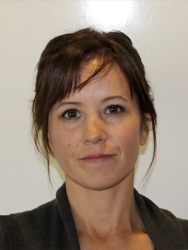|
Elizabeth Henry Scholarship - 2016 Fund Recipients > MICHELLE WALSH, B.Sc. MICHELLE WALSH, B.Sc. <br>Identifying thermal refugia and their use by Chinook salmon in a temperature sensitive streamposted on 1:00 PM, October 19, 2016
BIO
My passion and respect for salmon was initiated by my late Grandparents Ida and Frank George. I can recall from a very young age the seasonal fishing activities and the excitement that went with it. My first opportunity to work with salmon was at a local fish fence in highschool and since then I’ve worked throughout the Fraser River and Okanagan with all salmon species and life stages conducting all aspects of salmon management. As a fisheries biologist for the Secwepemc Fisheries Commission in Kamloops I have the honor of working with the Secwepemc Nation to assist them in providing stewardship for the fisheries and to assert their traditional fisheries rights within a co-management framework - this is accomplished as they are building capacity for self-government. As a mom of two very beautiful and amazing girls Olivia (6) and Kaya (4), finding time to do both work and graduate school (TRU, Kamloops) has been challenging but rewarding - I think they have trained me well at running on as little sleep as possible. I am thankful to everyone for all the support and the opportunity and, with this environmental science training, I hope to lead many more fisheries research projects to improve salmon health and management for all. PROJECT SUMMARY Salmon habitat rehabilitation efforts often require significant resources of time and money to effectively plan and implement, resources which are frequently limited. Habitat assessment and monitoring limitations can lead to assumptions that can affect the methods, tools, and ultimately the success of our rehabilitation efforts. At a time when many salmon populations are facing poor productivity, understanding how salmon are interacting with their habitat can form a key part of the habitat assessment. Stream-type, spring-run chinook salmon (Oncorhynchus tshawytscha) in the Deadman River have been managed by fisheries managers as a conservation concern for many years. Semi-arid conditions and land used for agricultural and forestry purposes are thought to influence temperature regimes in this and other Southern Interior streams. Stream temperatures frequently approach or exceed the upper thermal limits for both adult and juvenile salmon, and are likely a limiting factor for this population. Migration to cool water refuges such as outlets of cooler creeks and groundwater seepage sites is crucial during such situations; however, these microhabitats must be abundant and available if they are to mitigate high ambient stream temperatures. My thesis aims to document the quantity and quality of cool water habitats in the Deadman River, currently a data gap. Specifically I will:
Techniques to collect temperature data will include aerial thermal infrared radiation (TIR) scans and continuous water temperature monitoring. Chinook habitat use surveys will entail thermal-radio telemetry (adults). |
||
- About Us
- Programs & Services
- Climate Change & Air Quality
- Watersheds & Water Resources
- Sustainable and Resilient Communities
- Our Work in the Regions
- Resources
- News and Events


 Nadleh Whut’en First Nation, Lhtseh Yoo (frog) Clan; my community is part of the larger Dakelh Nation in the Central Interior of BC.
Nadleh Whut’en First Nation, Lhtseh Yoo (frog) Clan; my community is part of the larger Dakelh Nation in the Central Interior of BC.